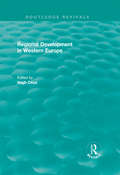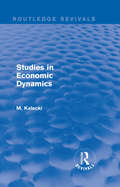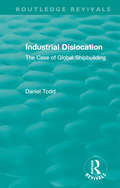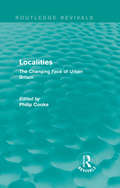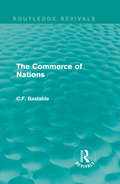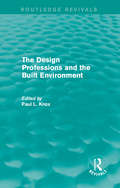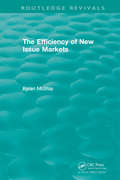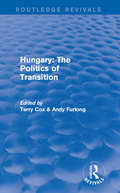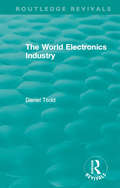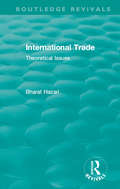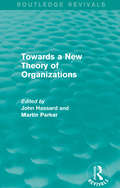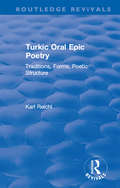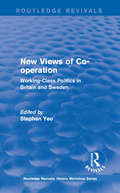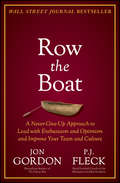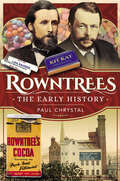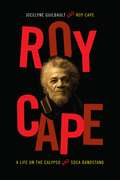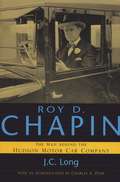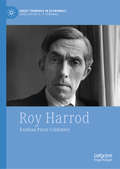- Table View
- List View
Routledge Revivals: Regional Development in Western Europe (1975)
by Hugh CloutFirst published in 1975, this book provides a straightforward examination of regional differences and regional development in the countries of Western Europe. Professor Clout divides this into two parts. The first examines a series of themes with reference to the whole of Western Europe, and the second part discusses regional development in individual countries or groups of countries. Contributions by experts from the UK and from mainland Europe present an essentially geographic approach, combining thematic and country-by-country discussions.
Routledge Revivals: Studies In Economic Dynamics (1943) (Routledge Revivals)
by M. KaleckiFirst published in 1943, this work contains five interconnected essays presenting the author's renowned additions to the business cycle theory. Written by one of the most distinguished economists of the 20th century, this work will be essential reading for students and scholars of the history of economic thought, monetary theory and macroeconomics.
Routledge Revivals: The Case of Global Shipbuilding (Routledge Revivals)
by Daniel ToddFirst published in 1991, this book offers a thorough examination of the decline of heavy industry in industrialised countries in the West, which focuses on problems in the shipbuilding industry. Todd argues that three points are central to its demise: industrial life cycles, the international division of labour and the energy crises of 1973. His work begins with despondency in western shipbuilding, going back as early as 1956, when Japan usurped Britain as the pre-eminent ship producer. The book goes on to explore international trade and industry in the second half of the 20th century, with analysis on industrial reorganisation and East Asian conglomerates, diversification with the marine industries, and shipbuilding in Brazil, India, and China.
Routledge Revivals: The Changing Face of Urban Britain (Routledge Library Editions: Social Theory Ser.)
by Philip CookeFirst published in 1989, this book examines seven different localities, ranging from the outer suburbs of large northern cities to small freestanding town, which were prospering in the 1980s or struggling against the negative employment effects of restructuring. Within the theoretical frame of ‘industrial restructuring’, it traces the development of each locality, exploring in depth the influence of several key elements — deindustrialisation, technological change, the shift to the services in employment — on social composition, political change and local policy. A major contribution to locality studies, this book is essential reading for students of urban and regional studies, and sociology.
Routledge Revivals: The Commerce of Nations (1923)
by C.F. BastableFirst published in 1929, this book was written to express the belief that nations’ commercial policy and doctrines could best be explained by reference to their history. The author argues that this applies equally to legislation and theory, for example both the McKinley Act of 1890 and contemporaneous protectionism are examined as the culmination of a century’s worth of legislative and theoretical progress. This edition is also updated from the original 1891 publication to take account of the effect of the First World War on the European and American tariff systems, and also how the preferential system of trade within the British Empire recast relations between Britain and its dominions.
Routledge Revivals: The Design Professions and the Built Environment (Routledge Revivals)
by Paul L. KnoxFirst published in 1988, this book argues that discussions of urban development often neglect to consider that much of the urban environment is designed by architects and planners, and that the particular world-view of architects and planners is crucial for the way proposals are taken up, modified and carried out. The author explores the world-view of architects and planners, considering their approach to design and the factors which influence this — work patterns, career paths and the firms in which they operate. The author also studies their place in the political decision-making process as it affects urban questions and then explores how architects and planners roles are changing.
Routledge Revivals: The Efficiency of New Issue Markets (Routledge Revivals)
by Kyran McStayFirst published in 1992, The Efficiency of New Issue Markets provides a theoretical discussion of the adverse selection model of the new issue market. It addresses the hypothesis that the method of distribution of new issues has an important bearing on the efficiency of these markets. In doing this, the book tests the efficiency of the Offer for Sale new issue market, which demonstrates the validity of the adverse selection model and contradicts the monopsony power hypothesis. This examines the relative efficiency of the new issue markets and in turn demonstrates the importance of distribution in determining relative efficiency. The book provides a comprehensive overview of under-pricing and through this assesses the efficiency of new issue markets.
Routledge Revivals: The Politics Of Transition (Postcommunist States And Nations Ser.)
by Terry Cox & Andy FurlongFirst published in 1995, the aim of this book is to review various aspects of the process of democratic transition in Hungary over the period of its first post-communist, freely elected parliament between 1990 and 1994. The studies collected in this book attempt to put them in the context of longer-term trends in Hungarian politics. Hungary offers an example of the problems of political change common to Eastern Europe following the collapse of the Eastern Bloc but also demonstrates a relatively stable and successful transformation built on a unique experience under communist rule that helped prepare it for a market-orientated economy transition and political pluralism.
Routledge Revivals: The World Electronics Industry (Routledge Revivals)
by Daniel ToddFirst published in 1990, this book provides an overview of the global distribution of the electronics industry and the structural factors which promoted this distribution by the end of the 1980s. Regarded as a ‘flagship’ sector in both advanced and developing countries, the electronics industry is encouraged by governments everywhere. Covering both the civilian and the military sides of the industry, Professor Todd reflects on the future of civilian electronics in the light of its global segmentation, and hints at the fundamental role of governments in the unfolding of both civilian and defence-electronics developments. He also endorses the overwhelming significance of strategies being played by electronics enterprises in both the USA and Japan.
Routledge Revivals: Theoretical Issues (Routledge Revivals)
by Bharat HazariFirst published in 1986, this book examines international trade, offering different theories and considering contemporary developments. Professor Hazari connects these theories and developments, such as theories of comparative advantage and factor-price differentials, to economic expansion and terms of international trade. Many key economic problems are related to the theory of international trade, problems such as tariffs, the dependency of developing countries and changing patterns of world trade, and the book shows how theory impinges on these other important issues. The theory of international trade is a popular and widely taught specialism within economics. This book surveys the pure theory which forms the core of the topic.
Routledge Revivals: Towards a New Theory of Organizations (1994)
by Martin Parker John HassardFirst published in 1994, the essays collected in this book explore the impact and current status of the ideas put forth in David Silverman’s The Theory of Organizations, and how they relate to future directions in organization theory. After opening with a chapter by Silverman himself, the subsequent chapters investigate key issues in the study of organizations, including structure and agency, the politics of organization theory, and the meanings of post-positivist organizational analysis. Contemporaneous debates on postmodernism, the emotions, gender and structuration are discussed in the context of the development of organizational theory in the preceding twenty-five years — providing insights into the continuities within organizational theory and provoking thought about future directions.
Routledge Revivals: Traditions, Forms, Poetic Structure (Routledge Revivals)
by Karl ReichlOriginally published in 1992, Turkic Oral Poetry provides an expert introduction to the oral epic traditions of the Turkic peoples of central Asia. The book seeks to remedy the problem of non-specialists’ lack of access to information on the Turkic traditions, and in the process, it provides scholars in various disciplines with material for comparative investigation. The book focuses on "central traditions" of this region, specifically those of the Uzbeks, Kazakhs, Karakalpak’s, and Kirghiz and looks at the historical and linguistic background to a survey of the earliest documents, portraits of the singers and of performance considerations of genre, story-patterns, and formulaic diction, and discussions of "composition in performance", memory, rhetoric and diffusion.
Routledge Revivals: Working-Class Politics in Britain and Sweden (Routledge Revivals: History Workshop Series #9)
by Stephen YeoFirst published in 1988, this book sets out to reinterpret the changing place of working-class association in capitalist Britain. It argues that in combination, co-operation and association constitutes labour’s power — what is has to work with and who to work for — yet social historians have tended to overlook such views in a co-operative setting. What was the struggle, what form did it take, who were the protagonists and what relevance did they have to the community co-operators of the 1980s? The essays collected in this book explore class potential and class conflict within and against co-operative thought and practice.
Row the Boat: A Never-Give-Up Approach to Lead with Enthusiasm and Optimism and Improve Your Team and Culture (Jon Gordon)
by Jon Gordon P.J. FleckLearn to live and lead with enthusiasm and optimism, impact your team, and transform your culture In Row the Boat, Minnesota Golden Gophers Head Coach P.J. Fleck and bestselling author Jon Gordon deliver an inspiring message about what you can achieve when you approach life with a never-give-up philosophy. The book shows you how to choose enthusiasm and optimism as your guiding lights instead of being defined by circumstances and events outside of your control. Discover how to put the three key components of row the boat into practice in your life: The Oar: The energy. Only you can dictate whether your oar is in the water or whether you take it out and decide not to use it. The Boat: The sacrifice. The more you give, serve, and make your life about helping others, the better and more fulfilled your life will be, and the bigger your boat gets. The Compass: The direction. The vision you have for your life and the people you surround yourself with help create the dream of where you want to go. Perfect for athletes, coaches, business leaders, and anyone else who hopes to squeeze a little more enjoyment and productivity out of life, Row the Boat will propel leaders, teams, and organizations to greater heights than they have ever reached before.
Rowntrees: The Early History
by Paul ChrystalThe Rowntree family, especially Henry and the younger Joseph Rowntree are, along with the Fry’s, Cadbury’s, Mars and Terry’s, synonymous with the birth and growth of the chocolate industry in Britain. Between them, they were the chocolate industry in Britain. This book charts the fascinating story behind the birth and development of the chocolate empire that was Rowntrees. Background information to this astonishing business comes by way of chapters on the early history of the Rowntrees, contemporary York, the relationship between Quakers and chocolate, and the Tuke family – without whom there would have been no Rowntrees, and no Kit Kats. Henry, it is usually forgotten, was the founder of Rowntree’s – he made the momentous decision to sign the deal with the Tukes and we join him in those very early days of the fledgling company and watch how he helped it through some very dark, and sometimes humorous, times in what was then a very shambolic set up – cash strapped and making it up as the company lurched from crisis to crisis. Joseph, his elder brother, it was, who became the driving force to eventual global success, mixing his hectic business life with acts of compassion and a benevolent management model, all of which paved the way for decent wages, pensions, insurance and mutual respect in the workplace. Charity work extended beyond the factories to lift workers and others out of the slums of York to a life in a healthy model village, to provide a good social life, an extensive park, swimming pool and education for children and adults. More context is given with chapters on Joseph’s relentless industrial espionage, the advancements in chocolate production and 20th century rivals in the domestic and export markets, and mergers and acquisitions. Rowntree’s role in the two world wars is also covered along with the struggle Joseph Rowntree had accepting the importance of advertising. Altogether this book gives two fascinating biographies of two exceptional and driven brothers who came together to form one of our greatest companies - producing some of our best loved confectionery products.
Roy Cape: A Life on the Calypso and Soca Bandstand
by Jocelyne Guilbault Roy CapeRoy Cape is a Trinidadian saxophonist active as a band musician for more than fifty years and as a bandleader for more than thirty. He is known throughout the islands and the Caribbean diasporas in North America and Europe. Part ethnography, part biography, and part Caribbean music history, Roy Cape is about the making of reputation and circulation, and about the meaning of labor and work ethics. An experiment in storytelling, it joins Roy's voice with that of ethnomusicologist Jocelyne Guilbault. The idea for the book emerged from an exchange they had while discussing Roy's journey as a performer and bandleader. In conversation, they began experimenting with voice, with who takes the lead, who says what, when, to whom, and why. Their book reflects that dynamic, combining first-person narrative, dialogue, and the polyphony of Roy's bandmates' voices. Listening to recordings and looking at old photographs elicited more recollections, which allowed Roy to expand on recurring themes and motifs. This congenial, candid book offers different ways of knowing Roy's labor of love--his sound and work through sound, his reputation and circulation as a renowned musician and bandleader in the world.
Roy D. Chapin: The Man Behind the Hudson Motor Car Company
by Charles K. Hyde J. C. Long"John Cuthbert Long's Roy D. Chapin is a thorough and detailed biography of a remarkable, but little-known Detroit automobile industry pioneer. Historians should include Roy Dikeman Chapin (February 23, 1880-February 16, 1936) in any listing of significant American auto industry pioneers, along with the Duryea brothers, Ransom E. Olds, Henry Leland, Henry Ford, William C. Durant, and the Dodge brothers. Outside the cloister of automotive historians, Roy Chapin is an unknown. This is in part because no company or car bore his name. Unlike many contemporary auto pioneers, Roy Chapin was a modest man who did not promote himself. Even Long's superb biography of Chapin is not well-known because it was privately printed in 1945 with a small press run. In reprinting this volume, Wayne State University Press is making an important contribution to automotive history."--From the introduction by Charles K. Hyde, Department of History, Wayne State University
Roy Harrod (Great Thinkers in Economics)
by Esteban Pérez CaldenteyThis landmark book describes and analyzes the original contributions Sir Roy Harrod made to fields including microeconomics, macroeconomics, international trade and finance, growth theory, trade cycle analysis and economic methodology. Harrod’s prolific writings reflect an astounding and unique intellectual capacity, and a wide range of interests. He became Keynes´ biographer and wrote a volume on inductive logic. At the policy level, Harrod played a central role in the formulation of the Keynes´ Clearing Union plan for international monetary reform. He also actively participated in British politics and government and gained recognition as an expert in the field of international economics. Yet, until now, Harrod has remained an underrated economist, commonly misunderstood and misrepresented. This is the first major intellectual biography of Harrod to be published.
Roy Thomson Hall: A Portrait
by William Littler John TeraudsA vibrant, richly illustrated commemorative book celebrating the first 30 years of Roy Thomson Hall, one of Canada’s most famous performance venues. Roy Thomson Hall: A Portrait traces the first 30 years of what was initially known as "New Massey Hall." Arthur Erickson’s iconic design quickly became a symbol of a vibrant city emerging on the world stage. Home to the Toronto Symphony Orchestra, the hall has welcomed a range of acclaimed artists and lecturers, film presentations, and corporate events. The authors provide a background to the musical history of Toronto and an intimate portrait of the hall’s changes over the years. At the centre of this story are the artists, audiences, volunteers, and staff who have enriched and enlivened the hall since its opening in 1982.
Royal Bank of Scotland Group: The Human Capital Strategy
by Boris Groysberg Eliot ShermanDescribes the development and implementation of one of the world's most advanced human resource management support systems. The Royal Bank of Scotland Group is a global banking leader that began implementing a strategy for measuring the impact of human capital on bottom-line financial metrics in 2000. Spearheaded by HR executive Greig Aitken, this strategy included the use of an online toolkit of software through which HR executives could measure employee performance, gauge its impact on business performance, and commission new unit-specific surveys and studies. Aitken faces several challenges in advancing the use of human capital strategy throughout the Group: namely, how should he further build buy-in among key Group executives? And how should the Group respond when human capital analysis reveals some startling results in one of its most important divisions?
Royal Bank of Scotland: Masters of Integration
by James Weber Nitin NohriaDescribes the acquisition of Nat West by Royal Bank of Scotland. Describes the strategic rationale for the acquisition and the process by which the integration of the two banks was accomplished. The acquisition is remarkable for how successful it was, given the typical high rate of failure of similar acquisitions. Teaching Purpose: To teach about the general lessons of successfully implementing mergers and acquisitions.
Royal Caribbean Cruises Ltd.
by F. Warren Mcfarlan Valerie MassoniFocuses on the current IT applications portfolio and plans for the world's second largest cruise line. An IT-intensive organization, it forces students to think through how IT resources should be allocated in this dynamic environment and what kind of management system is most appropriate.
Royal Caribbean Cruises Ltd.: Safety, Environment and Health
by John A. Quelch Margaret RodriguezIn January 2014, Gary Bald, senior vice president of Safety, Environment and Health at Royal Caribbean Cruise Lines (RCL), prepared for a review meeting with the company's chief executive, Adam Goldstein, and chairman, Richard Fain. Prior to joining RCL in 2006, Bald had spent 28 years with the Federal Bureau of Investigation. After seven years of upgrading security for the cruise line, Bald stated, "We've come a long way, but what keeps me up at night is what I don't know." As he prepared for his meeting with Fain and Goldstein, Bald considered whether his department's current initiatives would be sufficient to maintain RCL's position at the cutting edge of cruise industry best practice, and whether RCL could and should differentiate itself in marketing from its competitors in the areas of safety, environment and health.
Royal Caribbean Cruises Ltd.: Safety, Environment and Health
by John A. Quelch Margaret RodriguezIn January 2014, Gary Bald, senior vice president of Safety, Environment and Health at Royal Caribbean Cruise Lines (RCL), prepared for a review meeting with the company's chief executive, Adam Goldstein, and chairman, Richard Fain. Prior to joining RCL in 2006, Bald had spent 28 years with the Federal Bureau of Investigation. After seven years of upgrading security for the cruise line, Bald stated, "We've come a long way, but what keeps me up at night is what I don't know." As he prepared for his meeting with Fain and Goldstein, Bald considered whether his department's current initiatives would be sufficient to maintain RCL's position at the cutting edge of cruise industry best practice, and whether RCL could and should differentiate itself in marketing from its competitors in the areas of safety, environment and health.
Royal DSM N.V.: Information Technology Enabling Business Transformation
by Lynda M. Applegate Edward Watson Mara E. VatzDescribes how Royal DSM NV, an $8 billion dollar global corporation, leveraged information technology to enable a major corporate portfolio transformation between 2000 and 2006.
